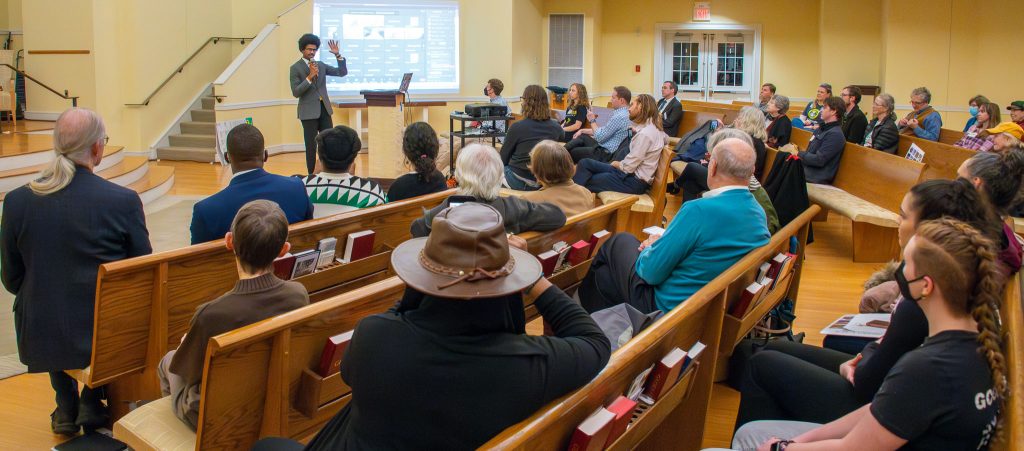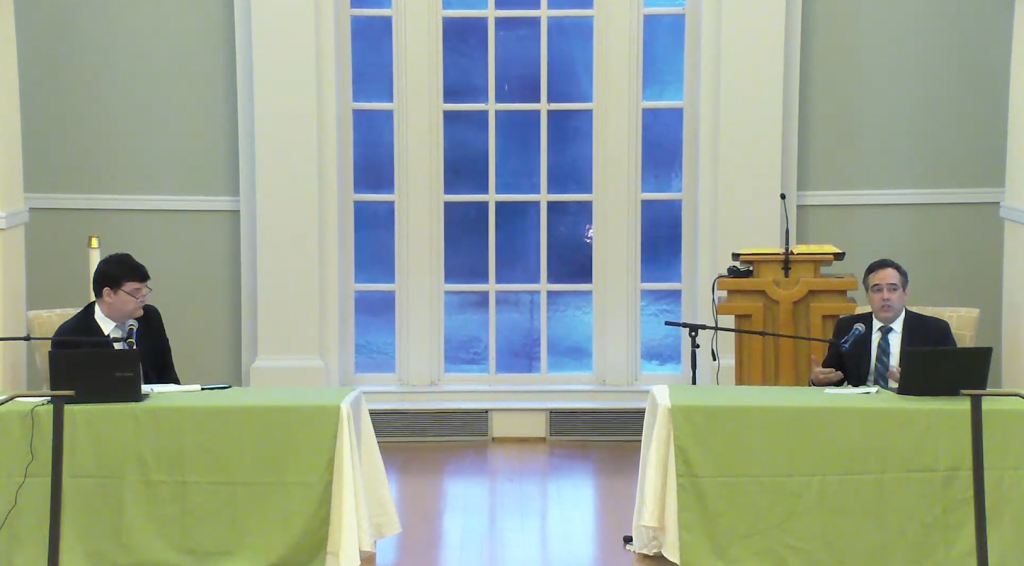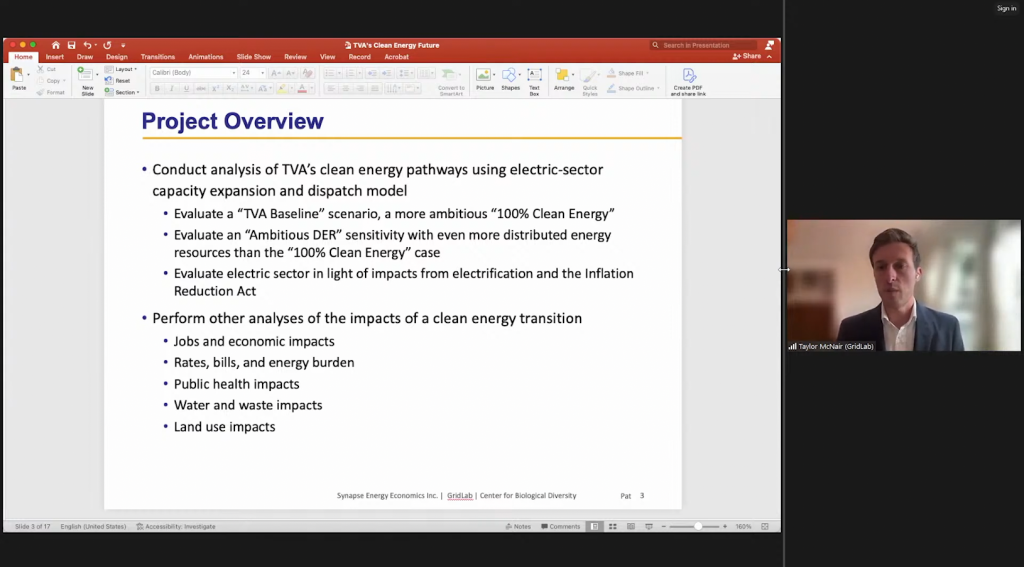Front Porch Blog
“The largest gas buildout of any utility in the country is being planned by the Tennessee Valley Authority. Pipelines after pipelines after pipelines after expansion of fossil fuels, creating the problem of climate change and then telling us it’s a bridge fuel,” boomed Tennessee state Rep. Justin J. Pearson to a rapt audience assembled at a Nashville church. “[TVA is saying] this is what’s going to get us out of the climate crisis — more fossil fuel extraction.”
Pearson was speaking to a group of people gathered for the People’s Voice on TVA’s Energy Plan, a day-long hearing and community discussion on TVA’s roadmap for how it will meet the Tennessee Valley’s growing demand for energy during the next 20-plus years. Unlike many of TVA’s neighboring utilities, the federal utility’s IRP is not regulated by a public utilities commission and there is no outside oversight on how TVA conducts the process.
TVA is the country’s largest public utility with 10 million customers across seven states, but advocates say the utility isn’t doing a good job involving the public or third party experts in the planning process for its Integrated Resource Plan, which will be completed by the end of 2024.

Rep. Justin J. Pearson speaks to community members assembled for the evening discussion during the People’s Voice on TVA’s Energy Plan. Photo by John Todd Waterman
Pearson’s moving speech kicked off an evening of community discussion that featured recorded messages from U.S. Sens. Ed Markey, D-Mass., and Sheldon Whitehouse, D-R.I. Community members broke into small groups to talk over what they had learned from the day’s events, which included testimony from energy industry experts. In their reports from the discussion, community members overwhelmingly rejected TVA’s plans for a gas buildout, urged the utility to use more renewable energy sources, called for more transparency and asked for a more active role from local utility companies that purchase power from TVA.
Community members also agreed the federal government should step in to mandate more transparency and accountability from TVA. Fittingly, U.S. Rep. Steve Cohen, D-Tenn., started the hearing earlier in the day by announcing in a recorded message that he would introduce the TVA Increased Rate of Participation Act in Congress. Cohen said TVA is leaving the public out of its decisions, contrasting TVA’s process with that of for-profit utilities, which share their data and are required to get public input.
“TVA is a publicly-owned power company, “ Cohen said.“They don’t act like one.”
Tell your legislators to bring accountability to TVA
Energy industry experts testify
In November 2023, several nonprofit organizations, including Appalachian Voices, submitted a request for more transparency and public engagement in TVA’s long-term planning process, known as an integrated resource plan, or IRP. The board failed to respond to the groups’ “Motion to Intervene” for more than 30 days and in turn, advocates announced they would hold their own hearing in January 2024.
The People’s Voice on TVA’s Energy Plan was chaired by Ted Thomas, a former chairman of the Arkansas Public Service Commission, the entity responsible for regulating that state’s utility companies. Thomas oversaw expert testimony from several witnesses and questioned the experts at the end of their statements — a process that mirrors the IRP process with other regulated utility companies.

Community members from the Tennesse Valley pose for a picture during the People’s Voice on TVA’s Energy Plan. Photo by John Todd Waterman
Elizabeth Stanton from the Applied Economics Clinic was the first to testify by giving an overview of what integrated resource plans are and how TVA’s IRP compared to IRPs in other settings. Stanton noted how the TVA was required by the U.S. Energy Policy Act of 1992 to provide adequate and reliable power to its customers at the lowest cost. Stanton testified that TVA’s IRP is different from other IRPs because it does not select a “preferred portfolio.” In their planning processes, utility companies create different scenarios using different power sources to meet projected energy demand, known as portfolios. At the end of a traditional IRP, a utility company will then choose its preferred portfolio that it will model its energy production on and a state regulatory commission will decide whether the portfolio is an appropriate path forward.
“TVA’s failure to develop a preferred plan from its IRPs eliminates accountability from TVA’s planning,” Stanton said. If TVA doesn’t select which portfolio it prefers, there is nothing to hold it accountable to when it starts building new power plants.
Stanton also pointed out that TVA’s 2019 IRP contained errors in modeling that “put the thumb on the scale” in favor of gas-fired power generation by dismissing the viability of renewable energy resources and energy efficiency to replace its retired coal plants. Stanton said TVA’s listening sessions were not enough to include public input in its IRP. She mentioned that other IRP processes involve “robust stakeholder processes” with lengthy series of technical workshops attended by both stakeholders and third-party experts in electric sector planning.
When asked by Thomas what she would recommend to TVA to improve its IRP process, Stanton responded that TVA should be more transparent and that agency should set aggressive climate goals in line with Biden administration’s executive orders to achieve carbon-free electricity by 2035 by taking advantage of funding opportunities and tax credits from the Inflation Reduction Act.
Following Stanton was Peter Hubbard of the Georgia Center for Energy Solutions. Hubbard presented the case that TVA’s plans for a methane gas buildout would increase costs and risks for TVA and its customers in terms of reliability, resiliency, affordability and sustainability. Hubbard cited fluctuations in the international gas market that would leave TVA’s customers vulnerable to rising fuel costs and price volatility.
“Since TVA passes its fuel costs directly to customers, it is TVA’s customers who are forced to bear this unlimited upside risk,” Hubbard said. Operating a gas plant isn’t considered risky for a utility company because it will always recover its costs no matter how much the price changes, Hubbard summarized.

Ted Thomas listens to Hubbard’s testimony in this screenshot taken from the livestream of the People’s Voice on TVA’s Energy Plan.
Hubbard touched on how unreliable gas-fired power generation can be during extreme weather, highlighting the experience of 2022’s Winter Storm Elliott, which forced TVA to implement rolling blackouts due to failures at its fossil fuel plants.
“Thirty percent of TVA’s gas-fired units experienced correlated outages due freezing equipment,” Hubbard said, adding that fuel supply shortages exacerbated TVA’s outages.
Hubbard also lauded the potential of distributed energy resources — small-scale energy resources usually situated near sites of electricity use, such as rooftop solar panels and battery storage. He said these distributed resources generate economic development by allowing TVA’s customers and ratepayers to invest their own money in local, distributed generation. He lamented that TVA acknowledged the benefit of distributed energy resources in its 2019 IRP, but has dismissed its large-scale development.
Next on the witness stand was Taylor Allred of Greenlink Analytics, who denounced TVA’s failure to address the impacts of its decisions that disproportionately affect communities of color and low-income communities. He cited the dumping of coal ash waste in a Black community following the Kingston coal ash spill and how that incident irreparably damaged the health of cleanup workers. He also called out TVA for not emphasizing environmental justice in its 2019 IRP and failing to develop an environmental justice strategic plan as recommended by the Biden administration’s Justice 40 Initiative.
“We found that a 100% clean energy transition for TVA would deliver over $255 billion in economy-wide net savings for [Tennessee] Valley customers. The transition would support 15,000 jobs each year, and deliver over $27 billion in public health benefits.” — Taylor McNair, program manager for GridLab
Allred also highlighted that TVA’s customers experience some of the country’s highest energy burden — the percentage of a household’s income that is spent on electricity — particularly in Memphis, a Black majority city. Allred also pointed out the link between energy burden and high asthma rates in a community. Allred recalled how in 2016, he coordinated meetings with TVA management and community members who complained of unaffordable utility bills and inefficient housing that made it difficult to maintain healthy indoor temperature levels.
“Energy burden can be a life-or-death issue. Just last week, TVA experienced a record load event due to freezing temperatures, which left 14 people dead in Tennessee,” Allred said.
The hearing’s final expert witness was Taylor McNair, a program manager from GridLab. McNair detailed how GridLab and the Center for Biological Diversity worked with Synapse Energy Economics on a report that evaluated TVA’s planning process to help understand if TVA’s current proposals are aligned with the needs of TVA customers. The report concluded that TVA can accelerate fossil fuel retirements, increase its renewable energy resources and reduce costs for ratepayers while bringing economic and environmental benefits to the region.
“We found that a 100% clean energy transition for TVA would deliver over $255 billion in economy-wide net savings for [Tennessee] Valley customers,” McNair said. “The transition would support 15,000 jobs each year, and deliver over $27 billion in public health benefits.”

Taylor McNair from GridLab gives an overview of the report his organization worked on with Synapse Energy Economics and Center Biological Diversity in his virtual testimony during the hearing.
McNair said that the analysis produced with Synapse and CBD presented a potential pathway for TVA to serve as a model for the rest of the nation’s power sector as it works toward decarbonization.
As a state legislator from Memphis, Pearson recalled in his speech later in the evening how TVA had poisoned his community with toxic coal ash, excluded another community from having a voice in a solar energy project and how Memphis organized to defeat the proposed Byhalia oil pipeline . Pearson called on people to come together to demand transparency and accountability from TVA
“The time is now to activate our people power to change the course of Tennessee and American history,” he said, adding that it was our responsibility to guarantee clean air, soil and water for future generations.
Pearson’s words echoed themes from during the public hearing earlier — TVA was founded during the Great Depression in response to the crisis of poverty the country was facing, and advocates said now is the time for the agency to respond to another crisis the country is facing: climate change.
But for the utility to rise to the challenges we face today, it needs to put the “public” back in public power and act in the best interests of the people it serves. The concerned TVA customers, electricity sector experts and community advocates at the event in January charted a better path forward, and we’re just getting started.
Tell your legislators to support transparency and accountability!
The People’s Voice on TVA’s Energy Plan was organized by Appalachian Voices, Energy Alabama, Southern Alliance for Clean Energy, Sunrise Nashville, Center for Biological Diversity, Climate Reality Project: Memphis and Nashville chapters, and Vote Solar.
PREVIOUS
NEXT
Related News

Leave a comment
Your email address will not be published. Required fields are marked *
